August 2017 Newsletter
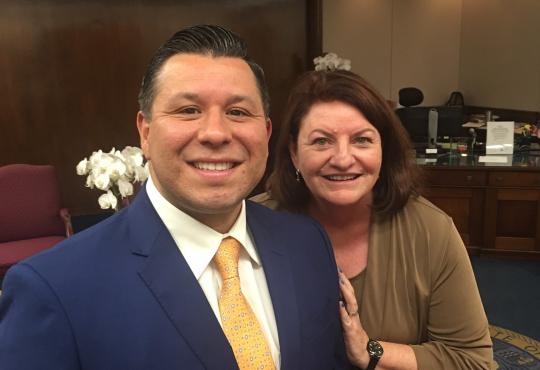
My former Assembly colleague Eduardo Garcia is the author of AB 398, the main Cap and Trade bill. He has become a leading clean-air champion since he traveled with me to the Paris climate summit in 2015. |
There was reason for celebration on July 17 when the Senate and Assembly worked with Gov. Jerry Brown to pass a package of bills that will extend California’s Cap and Trade program, clean up the air in our communities and continue our leadership role in the fight against climate change.
But what made it even better was that it passed with bipartisan support – Democrats and Republicans coming together to move California forward.
Cap and Trade, launched in 2012 and extended through 2030 with the passage of AB 398, is an innovative and unique way to reduce harmful emissions – a model that other U.S. states and international cities will follow.
The President in June pulled our country out of the historic Paris Agreement on climate change. We Californians have to continue to take control of our state’s future and provide the leadership that the federal government is no longer interested in providing.
California recently made its already-ambitious greenhouse-gas reduction goals even stronger, pledging to reduce emissions to 40 percent below 1990 levels by 2030. Cap and Trade is crucial to meeting those goals. It’s a market-based, incentive-style approach to compelling our heaviest polluters to clean up their industries.
The program caps an industry’s total amount of allowable emissions, and that cap is reduced over time. That’s how we get the overall emissions reductions we’re seeking.
Within that capped system, we allow industries to buy emissions credits at state-run auctions, giving these companies flexibility to comply with increasingly green mandates.
Industries are adapting to a changing landscape – they are going greener all the time. Cap and Trade gives the process a clear structure. Companies will comply with increasingly stringent mandates rather than pay to stay dirty and are rewarded for going green by being allowed to sell emissions credits on a secondary market.
Meanwhile, the state spends the revenue it receives from the program on ways to make our state greener and more sustainable. One of the ways it does this is by funding the Sustainable Communities program, which supports affordable housing located close to transit, addressing two crises at once: housing affordability and climate change.
When I was Speaker of the Assembly, I led the effort to allocate a percentage of Cap and Trade funds toward Sustainable Communities, and it’s resulted in hundreds of millions of dollars to help stabilize struggling families.
With Cap and Trade set to expire in 2020, the market was beginning to fail under the weight of uncertainty. Without an extension, California would have been in danger of failing to meet our ambitious, world-leading climate goals. It would have sent a message to others who are following our example that the one model to reduce greenhouse-gas emissions wasn’t sustainable over time. Doing nothing would’ve been irresponsible, costing more than 270,000 jobs, according to one estimate.
Gov. Brown did a great job of marshaling a bipartisan coalition in support to extend Cap and Trade – everyone from rural conservatives to urban progressives.
Our industries got certainty, flexibility and a certain amount of relief from what would otherwise have been more draconian and expensive regulatory mandates. The alternative would have cost tens of billions of dollars more than Cap and Trade – about three times as much.
And those of us who are concerned about excessive pollution in disadvantaged neighborhoods got a companion bill, AB 617, which will result in cleaner air in our local communities. Think, for example, places like San Diego’s Barrio Logan, where residents have been disproportionately affected by childhood and adult asthma because they have had to live side-by-side with polluting businesses.
Current programs tackle air pollution at a regional level to comply with broad state and federal air-quality standards. AB 617 seizes opportunities to comprehensively address air pollution where it matters most – at the neighborhood level.
Together, AB 398 and AB 617 mark an important milestone in the fight against climate change and the battle for cleaner air.
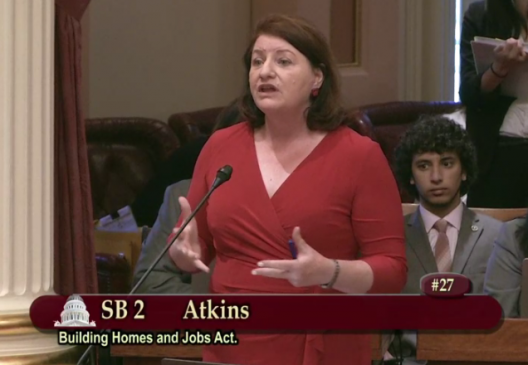
My 2017 bills – addressing issues of housing, human trafficking, healthcare, LGBT rights, environmental protection, labor, and juvenile justice – are making their way through the legislative process. Here’s what happened in July:
SB 2: The Building Homes and Jobs Act, SB 2, passed on the Senate floor on July 6th and cleared the Assembly Housing and Community Development Committee on July 12th. It creates a permanent source of funding for affordable housing by imposing a modest fee on the recording of certain types of real-estate documents – not including the sale of residential or commercial property. California’s housing crisis is getting worse day by day, and too many people are spending most of their income on housing. This bill will help thousands of struggling families every year.
SB 2 is my primary focus in August as I work with my colleagues to garner support. I am pleased to have the backing of Gov. Jerry Brown, Senate President Pro Tem Kevin de Leon and Assembly Speaker Anthony Rendon, who on July 17 jointly announced that a package of housing bills would be a priority after the summer recess. That package also includes SB 35, which streamlines housing development in cities that aren’t building enough homes, and SB 3, which would place a $3-billion affordable-housing bond measure on the November 2018 statewide ballot. I am a proud co-author of both of those bills.
SB 179: The Gender Recognition Act, SB 179, cleared the Assembly Transportation Committee on July 10th. The bill would make California the second state in the country, behind Oregon, to allow nonbinary residents – those who self-identify as neither male nor female – to choose a third gender marker on driver’s licenses and the first to allow it on other state-issued identity documents, such as birth certificates.
It would also make it easier for transgender, intersex or nonbinary Californians to obtain state identification documents that accurately reflect their gender, removing several barriers that make it onerous for people seeking name- and gender-change court orders or seeking a gender change on birth certificates, driver’s licenses, and identity cards.
SB 230: Right now, a prosecutor attempting to convict an accused sex trafficker is not allowed to bring up the defendant’s past sex-trafficking crimes as evidence in trial. That is not the case for certain other types of sex crimes.
SB 230 would add sex trafficking to the list of offenses for which prosecutors may, with a judge’s permission, share this type of information with the jury. This will make it easier to convict sex traffickers. The bill cleared the Assembly Public Safety Committee on July 12th.
SB 285, which cleared the Assembly Appropriations Committee on July 19th, strengthens the law by making it clear that not only do public employees have the right to form a union or engage in union activities without interference – they also have the right to become members or remain as members of a union without interference, intimidation, or coercion.
SB 310: Transgender people who are incarcerated should have the same right as anyone else to legally change their name or gender and to be recognized for who they are.
SB 310 – the Name and Dignity Act – establishes the right of people incarcerated in state prisons and county jails to access the courts to obtain a name or gender change. It also requires corrections officials to use the new name of a prisoner who has successfully obtained a name change.
In addition to providing transgender prisoners with a sense of dignity while incarcerated, SB 310 will increase the chances for them to successfully reenter society. The bill cleared the Assembly Public Safety Committee on July 12th.
SB 379: This bill, which cleared the Assembly Health Committee on July 12th, makes minor changes to current law that I believe will have major impacts on child oral health in the future.
The bill allows schools to facilitate dental screenings by requiring parents to opt-out if they do not want their children to receive an assessment. However, any treatment of students would still require prior consent. It also adds data on tooth decay to the list of data that must be reported to the county and encourages schools to send oral-health data to the state.
SB 379 will allow us to screen more children, which will in turn lead to more treatment, better collection of statewide data, and improved overall oral-health strategies.
SB 437: This bill, which passed the Assembly Health Committee on July 11th, improves the effectiveness of a joint working group of the Department of Managed Healthcare and the Department of Insurance. It does this by requiring the group to review two new topics: grievance and consumer-complaint processes that pertain to timely access to care, and state implementation of federal healthcare reforms.
SB 587: Currently, probation officers are not permitted to display blue warning lights on their certified emergency vehicles, as other law-enforcement officers are. But probation officers at times are called on to respond in emergency situations, and without blue lights, they’re not able to alert other officers and the public when responding that they are peace officers and are there to assist.
The bill, which cleared the Assembly Transportation Committee on July 11th, would allow probation officers, after completing appropriate training, to display blue warning lights on their emergency vehicles.
SB 625: This bill, which passed the Assembly Public Safety Committee on July 12th, would reestablish an “honorable discharge” program for juvenile offenders who meet certain criteria, paving an easier path for them to access higher education or vocational training or get a job after their release from incarceration.
Please visit senate.ca.gov/atkins for a complete list of my bills moving through the Legislature.

From the bottom of my heart, I want to thank everyone throughout the 39th Senate District who participated in our Socks for Stand Down drive. Working together, we donated nearly 2,200 pairs of new socks, 200 pairs of underwear and a few boxes of gently used clothing to our homeless veterans at San Diego Stand Down, which took place July 21 through 23. The veterans and the organizers were incredibly grateful, and so am I.
I am happy to partner with Assemblymember Dr. Shirley Weber and San Diego City Council President Myrtle Cole and present the 5th Annual Health Fair and Back to School Kickoff. The free public event happens from 10 a.m. to 2 p.m. Saturday, August 19th, at the O’Farrell Charter School, 6130 Skyline Drive in San Diego.
Health professionals will be on hand to offer an array of screenings, including dental, vision, blood pressure, cholesterol, HIV and glucose. There will also be educational activities, backpack giveaways, school supplies, games and face-painting for kids, food trucks serving healthful eats and more.
I will be there to chat with you about current legislation and community issues.
If you have questions, please call Dr. Weber’s office at 619-531-7913.
My district staff is always available to help constituents navigate a complex web of state agencies.
Recently, my office was contacted by a constituent who needed help with the Board of Registered Nursing (BRN). Her license due to expire on June 30th, she sent all of her information, payment and LiveScan fingerprints to the BRN during the first week of May, giving the BRN ample time to process her enewal.
After some time without notice that her nursing license had been renewed, and she found out that her fingerprints had never been received. She re-did the LiveScan and faxed it in to the BRN as instructed but again was not hearing back.
She called my office for help. We were able to contact them on her behalf, explain the situation and get a copy of her LiveScan emailed directly to a representative. Her license was renewed the next day, allowing her to continue to help patients at two local healthcare facilities.
If you’re having trouble working out an issue with any state agency, please call my office at 619-645-3133, and my staff will do everything in their power to help.
My District Staff
Myrna Zambrano: District Director
Deanna Spehn: Policy Director
Jason Weisz: Senior Field Representative
Toni Duran: Field Representative
Chevelle Tate: Field Representative
Ryan Trabuco: Scheduler / Field Representative
David Rolland: Communications Director
Where to Find Me Online
Twitter: @SenToniAtkins
Facebook: facebook.com/SDToni/
Web: senate.ca.gov/atkins
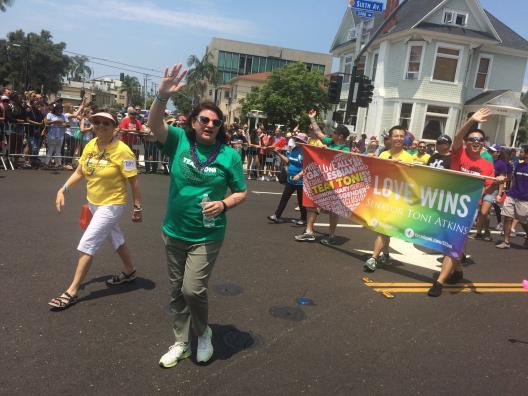
I love to celebrate LGBTQ Pride on a warm, sunny day in San Diego – perfect!
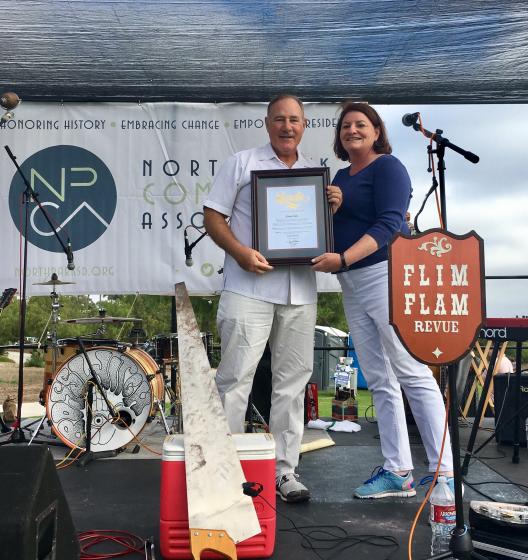
Kicking off the summer concert series in North Park’s Bird Park and recognizing past North Park Community Association President Edwin Lohr for his service.
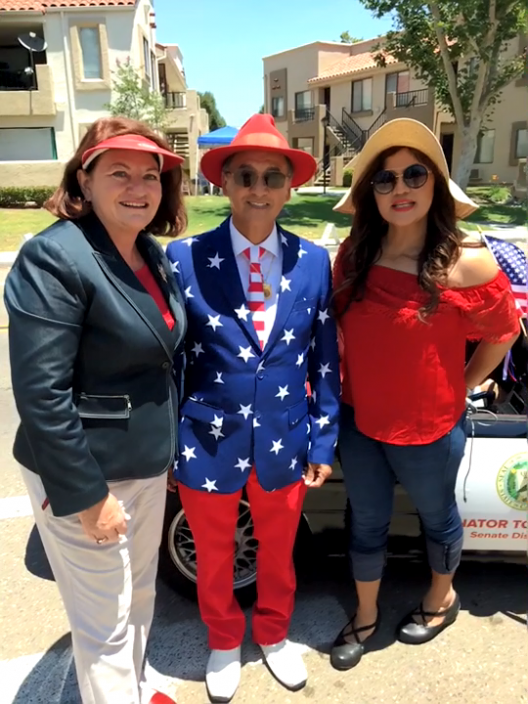
Great to spend time with the Mira Mesa community on the Fourth of July

Riding in style in the Rancho Bernardo Fourth of July Parade.

Saying happy birthday to our great nation in University City.
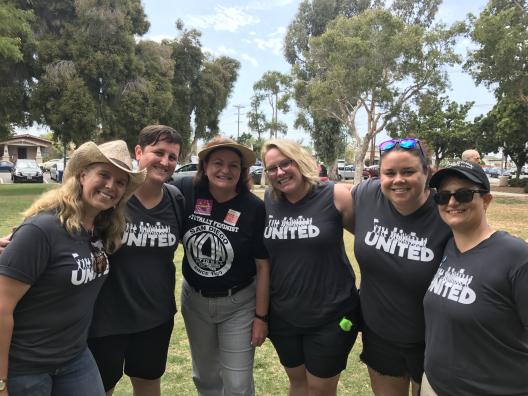
I am always happy to participate in SheFest and celebrate women’s empowerment.
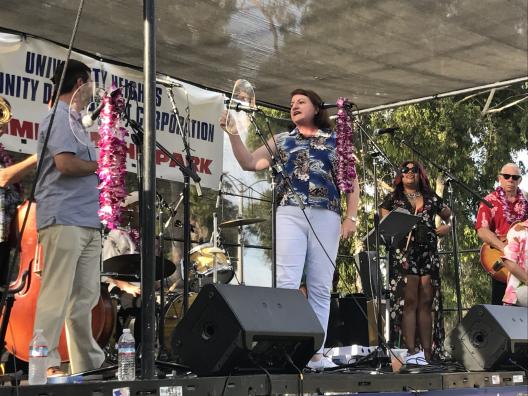
Launching University Heights’ Concerts in the Park was a colorful, festive occasion.
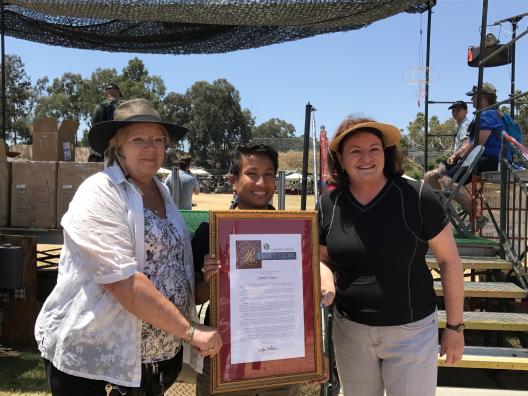
San Diego Stand Down for our homeless veterans is one of the important annual events that I attend. I am so grateful for these veterans and the people who help them.
